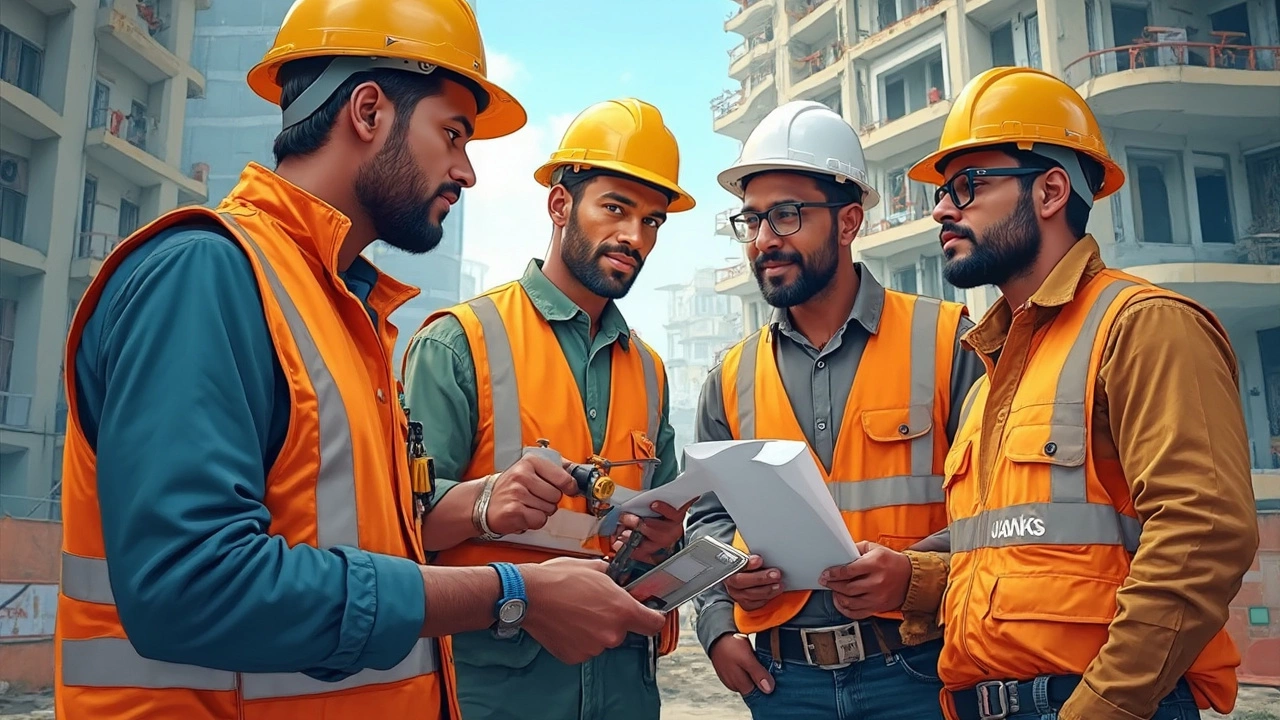If you’re eyeing the construction industry for serious pay, you don’t want guesswork. The money isn’t the same everywhere. Some labor jobs put you well above the blue-collar average, sometimes even above college grads.
Here’s the truth: Jobs like crane operators, pile driver operators, elevator installers, and boilermakers are at the top when it comes to paycheck size. These aren’t your entry-level gigs. You’ll need training, and you’ll work hard, but the payoff is no joke. For example, elevator installers are pulling in salaries that make office workers jealous—think $90,000 a year or higher in some states.
Before you head for that application, it pays to know the skills, certifications, and risks that come with those top spots. Some need an apprenticeship, others want a union card, and all of them expect you to actually show up and deliver. But if you’re tough, willing to learn, and not afraid of heights or big machines, the ceiling on your earnings gets a whole lot higher.
- The Real Money Jobs in Construction
- What Makes These Roles Pay So Well?
- Surprising Truths About the Top Earners
- Ways to Boost Your Construction Pay
- What to Watch Out for Before Choosing
The Real Money Jobs in Construction
The path to the biggest paychecks in construction is not always what people expect. We're talking about jobs that mix skill, sweat, and some serious guts. These gigs aren’t just swinging a hammer or carrying bricks. They take specialized know-how or nerves of steel. Let’s lay it out: who really gets paid the most in construction?
- Elevator installers and repairers: These folks make sure those lifts in office towers and apartments don’t break down. You need to be sharp and ready for tight spots. Once you’re certified, it’s common to clear close to $100,000 a year. Unions and city work can bump it even higher.
- Crane operators: Not just anyone can handle a machine that swings steel beams forty stories in the air. With the right license, crane operators often make $70,000 to $90,000, and overtime or night shifts can boost that further.
- Pile driver operators: Ever seen those giant machines hammering steel deep into the ground before a skyscraper goes up? That's this job. Median pay hovers around $70,000, and working on big city or federal jobs always means a fatter check.
- Boilermakers: These workers build and fix huge boilers and tanks for power plants or ships. It’s hard, dirty work, but $65,000 to $85,000 is the usual ballpark.
- Construction managers: Once you’ve been around the block, moving up into managing whole projects can get you six-figure salaries. But you’ll need plenty of hands-on experience and usually some schooling.
The right city or state can tack on tens of thousands, depending on demand. Here’s a look at what a year in the top jobs actually pays, based on 2024 data from the Bureau of Labor Statistics:
| Job Title | Median Annual Wage (US) | Typical Requirements |
|---|---|---|
| Elevator Installer/Repairer | $99,000 | Apprenticeship, License |
| Crane Operator | $77,000 | Certificate, On-the-job Training |
| Pile Driver Operator | $73,000 | Apprenticeship |
| Boilermaker | $68,000 | Apprenticeship |
| Construction Manager | $101,000 | Experience, Degree Preferred |
It pays to specialize. The more you know or the riskier your role, the fatter your wallet gets. If you’re serious about landing a highest paying construction job, it’s worth looking into these trades, even if it takes a couple of years to get there.
What Makes These Roles Pay So Well?
The best-paying jobs in construction aren’t random—they pay big because of skill, risk, and a real need for the work. You’ll notice the folks making the most are either putting themselves in tough situations, have amazing technical skills, or both. That pay bump doesn’t show up for nothing.
First off, let’s talk specialized skills. Not everyone can walk onto a site and start running a crane or installing an elevator. These jobs need serious training, certifications, and in almost every case, time spent learning under pros through apprenticeships. It’s a lot more than just muscle or stamina—think problem solving on the fly, safety know-how, and reading complex blueprints. Contractors know these skills are rare, so they pay up to keep good people.
Next is danger. High pay often matches up with high risk. If you’re hundreds of feet off the ground, moving tons of steel, or dealing with pressurized steam and electricity, you’re earning every dollar. The higher the risk of injury, the more they’ll shell out to fill the seat. Workers’ compensation premiums also go up, so bosses want qualified, safety-minded people.
Also, these spots are hard to fill. Not as many young folks want to jump into the trades anymore, so competition from employers can push pay higher. Plus, a lot of experienced workers are retiring, creating a shortage. Supply and demand kicks in big time.
Here’s a quick look at some average annual salaries to put it in perspective:
| Job Title | Average Salary (2024, USD) |
|---|---|
| Elevator Installer & Repairer | $93,000 |
| Crane Operator | $66,000 |
| Pile Driver Operator | $68,000 |
| Boilermaker | $66,500 |
If you want top dollar, look for highest paying construction jobs with rare skills, real risks, and big demand. That’s where the money lives.

Surprising Truths About the Top Earners
Say "construction labor" and most people picture hard hats and broken backs, not big paydays. The reality: some of the highest paying construction jobs crush that stereotype. These folks aren’t just swinging hammers—they're running the biggest machines, guiding heavy lifts, or installing systems nobody else wants to touch.
Check out what puts these jobs at the top:
- It’s not just about muscles. Technical know-how is massive. Crane operators, for example, use computers and radio gear all day.
- Licensing matters. Most states demand state or national certification for pile driver and elevator jobs. Forget winging it—proving you have the skills is key.
- Location changes everything. Paychecks are fatter in metro areas where tall buildings or heavy infrastructure are going up nonstop. For example, elevator installers in New York City make way more than those in smaller towns.
- Union membership is a ticket to the top. Unions handle tough bargaining and steady jobs—so wages don't dip during slow times. That’s why many of the top earners are union workers.
- Overtime is the norm. These jobs are often tied to big deadlines, so double shifts and weekend work can boost annual take-home pay by 10-20%—sometimes more.
Here’s a quick look at average pay for top roles according to the U.S. Bureau of Labor Statistics for 2024:
| Job Title | Average Annual Salary | Education/Training |
|---|---|---|
| Elevator Installers & Repairers | $96,000 | Apprenticeship, Licensing |
| Crane & Tower Operators | $70,000 | Trade School, Certification |
| Pile Driver Operators | $68,000 | Specialized Training |
| Boilermakers | $67,000 | Apprenticeship |
Another thing: injuries and burnout are real risks at this level. Working 60-hour weeks high above the ground or in cramped spaces isn’t for everyone. Still, if you want a fat paycheck without a four-year degree, these jobs punch above their weight class.
Ways to Boost Your Construction Pay
If you’re serious about cashing in on a highest paying construction jobs, you need a real plan. There are a few proven paths to boost your take-home pay—these work whether you’re just starting out or already swinging a hammer on big sites.
The big secret? The more skills and certifications you have, the bigger your check will be. Take a look at where the extra money comes from:
- Get Certified: Specialized licenses for crane operation, welding, or heavy equipment can jump your pay by 10-30% almost overnight. For example, a crane operator certification can take your hourly wage from $25 to $40 or more.
- Join a Union: Unions negotiate way better rates and benefits. In 2024, union plumbers and electricians earned 15-25% more than their non-union buddies across several states.
- Stack Up Experience: The longer you’re in the game, the more valuable you get. Contractors give fat bonuses for proven project leads, safe work records, and team management skills.
- Work Overtime or Remote Sites: Overtime rates are usually time-and-a-half, and remote jobs (like pipeline work in Alaska) can double your expected income. Just know those checks come with long hours and tough conditions.
- Level Up to Supervisor: Foremen and site superintendents don’t just boss people around—they earn 20-50% more than the folks on the tools. It’s less backbreaking and way better for your bank account.
Numbers talk. Here’s what a difference upgrading your role or skill can make:
| Role | National Avg. Hourly Pay (2024) | After Certification |
|---|---|---|
| Crane Operator | $34 | $44 |
| Elevator Installer | $44 | $55 |
| Welding Specialist | $27 | $36 |
| Electrician (Union) | $32 | $39 |
Don’t forget: Smart choices now can add up to tens of thousands more each year—not just in salary, but in benefits, overtime, and bonuses. The effort pays off way faster than most college degrees. So, if you want that bigger paycheck, invest in yourself with training and take on the jobs that others can’t or won’t do.

What to Watch Out for Before Choosing
Chasing the big bucks in construction sounds great, but there are things you really need to weigh before jumping into the highest paying construction jobs. Not every top-dollar gig fits every person, and some come with serious risks or trade-offs.
Safety is a huge one. Jobs like crane operation or elevator installation have higher injury rates than most office gigs. OSHA stats show that construction makes up about 1 in 5 worker deaths in the private sector, with falls, being struck by objects, and electrocution as leading causes. If you don’t like heights, noise, or risky environments, think twice. Wearing all the right gear and following safety rules isn’t optional in these fields—it’s a must.
Another thing is the path to get in. Many high-paying roles require apprenticeships, strict certifications, or union memberships. You won’t be earning those top wages from day one; you’ll put in the hours and pass tests. For example, becoming an elevator installer usually means four years of paid apprenticeship and passing a state exam. Not everyone makes it through, so grit matters as much as skill.
Work hours and job location can shake up your plans, too. Some jobs demand long shifts, overnight work, or travel to wherever the project sits. This isn’t a Monday to Friday, 9-to-5 world. You might be out in the cold, the heat, or even away from home for weeks at a time.
Here’s a quick table showing some of the realities for common high-paying construction jobs:
| Job | Average Annual Pay (US) | Typical Training | Risk Level |
|---|---|---|---|
| Elevator Installer | $94,000 | Apprenticeship (4 years) | High (heights, machinery) |
| Crane Operator | $65,000 | Vocational Training | Medium-High (accidents possible) |
| Boilermaker | $70,000 | Apprenticeship (4 years) | Medium (heavy lifting, heat) |
| Electrician | $60,000 | Apprenticeship (4-5 years) | Medium (electrical hazards) |
So, think about your comfort with risk, the time you’re willing to train, and how much unpredictability you can handle. Talk to real workers, check job boards in your area, and look at local union sites for honest info. The smartest move is picking a job that matches both your ambition and reality—not just your bank goals.


Write a comment